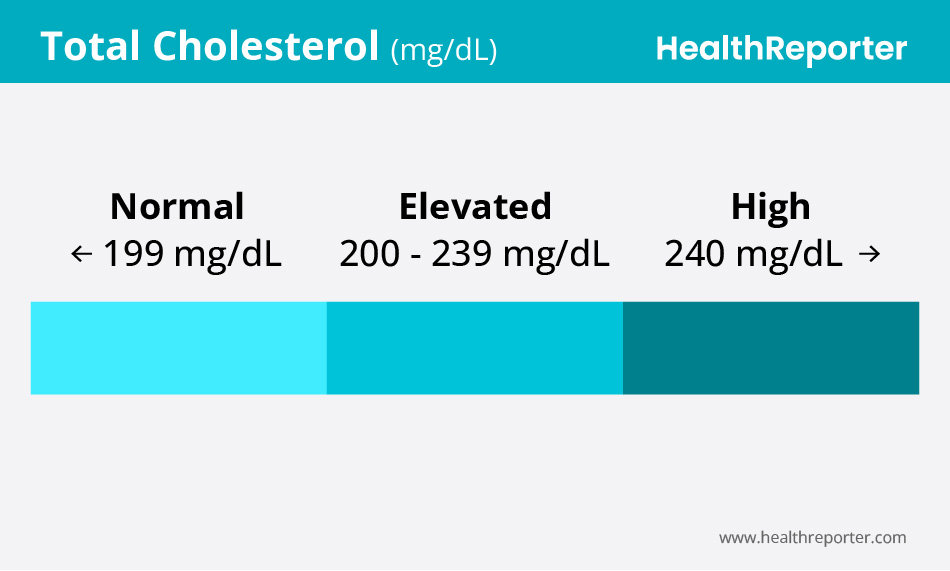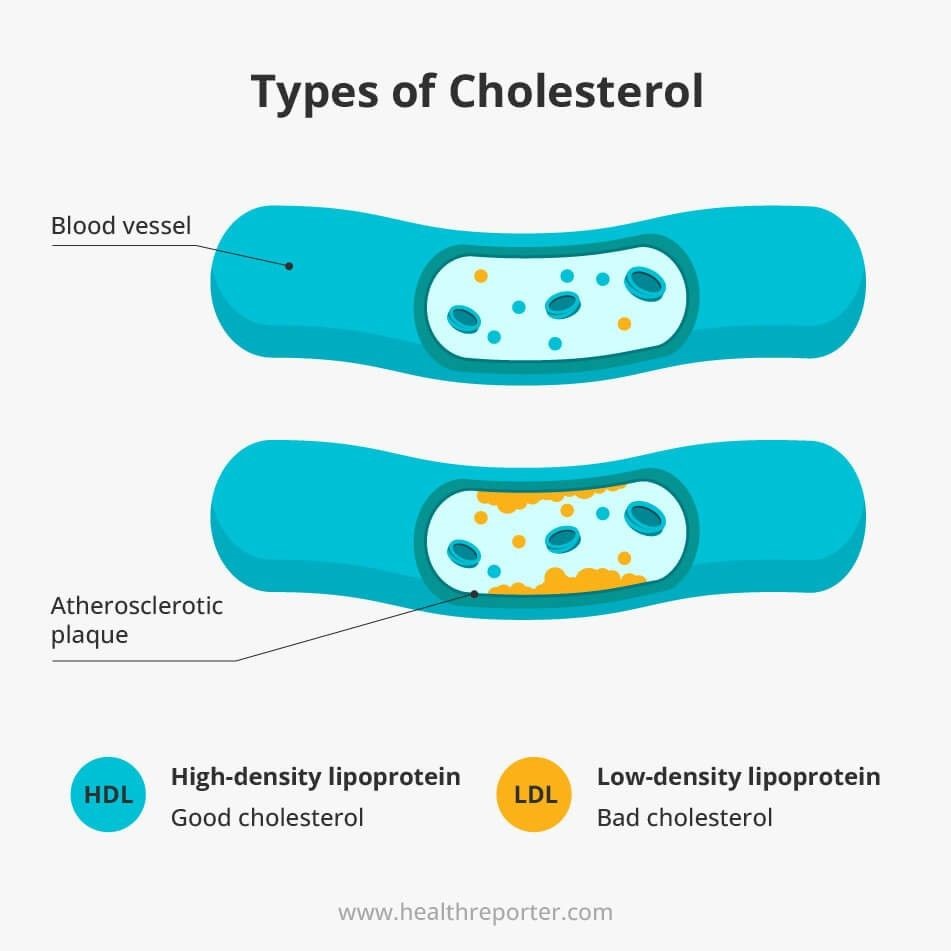Total cholesterol is an essential measure of blood cholesterol levels in your body. Blood test results can indicate whether your cholesterol levels are optimal or require attention. Read the article to understand the ranges and meanings.
What Are the Total Cholesterol Levels? Ranges and Meanings

Have you just received cholesterol blood test results and have no clue how to interpret them? While your doctor will brief you on the findings, it is beneficial to understand the ranges and their meanings to feel more confident about your health condition.
Total cholesterol levels are the main factor in understanding your health. High levels are linked to a higher risk of heart disease and stroke and require immediate attention.
In this article, we will explain total cholesterol levels, the optimal and borderline ranges, and what they mean.
What Is Total Cholesterol?
Total cholesterol includes both low-density lipoprotein (LDL or the “bad” cholesterol) and high-density lipoprotein (HDL or “good” cholesterol).

Cholesterol is a fatty substance produced by the liver and found in certain foods (dairy products, eggs, and meat).
Although it is essential for normal body functioning, too much cholesterol can be harmful. High blood cholesterol is linked to a higher risk of developing heart disease.
Total Cholesterol Chart/Ranges
Once you do a blood test, you will get the total cholesterol results in numbers. Usually, doctors brief the patients on the key findings. Still, you might want to know what those numbers mean, what range you fit into, and what it tells about your health.
Here are the possible cholesterol ranges and explanations:
| Type of cholesterol | Optimal (mg/dL) | Elevated (mg/dL) | High (mg/dL) |
| Total cholesterol | <199 | 200–239 | 240< |
| LDL cholesterol | <100 | 101–159 | 160< |
| HDL cholesterol | 61–99 | – | 100< |
| Non-HDL | <130 | – | 130< |
| Triglycerides | <150 | 151–199 | 200< |
It’s important to note that numbers alone are not enough to draw conclusions – they do not accurately predict the risk of heart issues.
Instead, they are a part of a larger equation that encompasses your age, lifestyle, harmful habits, blood pressure, and use of medicine. The more you meet these factors, the higher your risk of heart disease.
HDL cholesterol
HDL cholesterol, also known as “good” cholesterol, helps to remove LDL cholesterol from the arteries and transport it back to the liver for disposal. This helps keep the arteries clear and reduces the risk of heart disease and stroke.
- Optimal levels: 60mg/dL or higher
High HDL cholesterol levels are generally considered healthy, whereas low levels are associated with an increased risk of heart disease.
LDL cholesterol
LDL cholesterol is known as “bad” cholesterol. When there is too much LDL cholesterol in the blood, it can build up in the walls of the arteries, increasing the risk of heart attack and stroke.
- Optimal levels: less than 100mg/dL
The target level differs for each person, depending on their risk factors and overall health. Your doctor may recommend making lifestyle changes, such as eating a healthy diet and exercising regularly, to help lower your LDL cholesterol levels.
Non-HDL cholesterol
Non-HDL cholesterol is a more comprehensive cholesterol measure than LDL cholesterol alone, as it includes all other types of cholesterol in the blood.
- Optimal levels: less than 130mg/dL
Non-HDL cholesterol is calculated by subtracting your HDL level from your total cholesterol level.
Triglycerides
Triglycerides are the most common form of fat in the body and are an important source of energy. However, high levels of triglycerides can increase your risk of coronary artery disease, especially for women.
- Optimal levels: less than 150mg/dL
Triglycerides are typically measured as part of a lipid panel, along with total cholesterol, HDL cholesterol, and LDL cholesterol.
What Makes the Impact on Total Cholesterol Levels?
There are various factors that can impact total cholesterol levels. These include:
- Diet: A diet high in saturated and trans fats can increase cholesterol levels. Saturated fats are found in foods such as fatty meats, butter, and cheese, while trans fats are commonly found in processed and fried foods.
- Weight: Being overweight or obese can increase your cholesterol levels. High blood pressure might indicate an increasing weight.
- Physical activity: Regular physical activity can help lower your cholesterol levels.
- Age and gender: Men and women have different cholesterol levels, and your levels can change as you age.
- Family history: If you have a family history of high cholesterol or early heart disease, you may be at an increased risk of high cholesterol levels.
- Use of tobacco: Abstinence from smoking increases good cholesterol levels (therefore contributing to decreasing bad cholesterol levels).
- Use of alcohol: Drinking unmoderated amounts of alcohol can increase your cholesterol levels.
How to Reduce Total Cholesterol?
#1 Consume enough soluble fibers
A fiber-rich diet can positively impact your total cholesterol levels. The American Heart Association recommends eating at least 25 grams of soluble fiber per day. Sources of soluble fibers include oatmeal, lentils, beans, and fruits.
#2 Reduce saturated fats
Choose foods low in saturated and trans fats, such as fruits, vegetables, whole grains, and lean proteins. Get used to reading food labels and choose heart-healthy options.
It is always a good idea to eat fresh, homemade food instead of buying concentrated, pre-made or frozen meals. Homemade pasta will always be healthier than instant noodles.
#3 Reduce bad habits like smoking
Smoking can increase your cholesterol levels by causing waxy substance build-up in your arteries. Quitting smoking can help improve your cholesterol levels and overall health.
It is never too late to quit. As soon as you do that, the levels of bad cholesterol go down, and the levels of good cholesterol increase.
#4 Don’t forget to exercise
Regular physical activity can help lower your cholesterol levels. Aim for at least 30 minutes of moderate-intensity activity, such as brisk walking, most days of the week.
#5 Reduce alcohol consumption
Excessive alcohol consumption can increase your cholesterol levels. If you drink alcohol, do so in moderation.
#6 Take supplements and medications
In some cases, your doctor may prescribe medication to help lower your cholesterol levels. This is usually only recommended if lifestyle changes alone are not enough to lower your cholesterol levels.
It is important to work with your doctor to determine the best plan for lowering your cholesterol levels. This may include making lifestyle changes, taking medication, or a combination of both.
When Are Cholesterol Levels an Emergency?
A healthy total cholesterol level is less than 200 milligrams per deciliter (mg/dL). If your total cholesterol levels are 240mg/dL and higher, you should speak with a healthcare professional.
This is a borderline high level that can create roadblocks in your artery highways and disturb blood passage, thus damaging your organs.
How Often Should I Measure My Cholesterol Levels?
It is recommended to measure cholesterol levels at least once every 5 years (for people aged 20 or above). If you have heart risk disease factors, you should check them more frequently.
For healthy children without risk factors, it is advised to check cholesterol levels twice before they turn 18 years old. If they are prone to high cholesterol, parents should bring them to a doctor for a checkup more frequently.
Record Total Cholesterol Levels
Recording total cholesterol levels is an especially beneficial practice for keeping track of your health condition. Nowadays, there are many great apps to do that conveniently.
The one we can highly recommend is Cardi Health cardiovascular health app. It allows you to record your cholesterol levels, provides insights, generates doctor reports, monitors heart performance, and more.
- Personalized activity plan to suit the user
- Personalized nutrition plan
- Takes into account dietary requirements, preferences, and allergies
- Action plans generated from the tracking tool
- Real-time insights into your heart’s health performance
The app provides all the needed information to monitor heart conditions and cholesterol levels and eventually reduce the risk of heart disease.
A good total cholesterol level for men is generally considered to be less than 200mg/dL. Usually, male cholesterol levels tend to increase with age.
The optimal cholesterol level for women should be less than 200mg/dL. However, female cholesterol levels usually rise after menopause.
It’s generally recommended that children have a total cholesterol level of less than 170mg/dL. Kids are less likely to have high cholesterol.
A Word From MD
Total cholesterol levels can provide valuable information about your current health condition. If your levels are high, you might have a higher risk of cardiovascular disease.
Having your cholesterol levels checked regularly allows you and your doctor to monitor your levels and take steps to keep them within a healthy range.
It is generally recommended that adults have their cholesterol levels checked every 4–6 years, depending on their age, risk factors, and other criteria.
Getting an understanding of total cholesterol levels, the ranges, and their meanings can help you get into the habit of checking your health periodically. It is always easier to prevent cholesterol from increasing than lowering it when it has already reached an extreme high.
Conclusion
Periodical tracking of your cholesterol levels provides you with knowledge about your health condition. Test your blood regularly and notice any serious changes in time.
Frequent health checkups and cholesterol recording can help you manage cholesterol levels, so they never reach borderline high. And even if they do, you always have the data on what to tell your doctor.
Eventually, periodical health checkups can lead to a more satisfactory, healthier, and joyful life.

















































 Select your language:
Select your language: 



